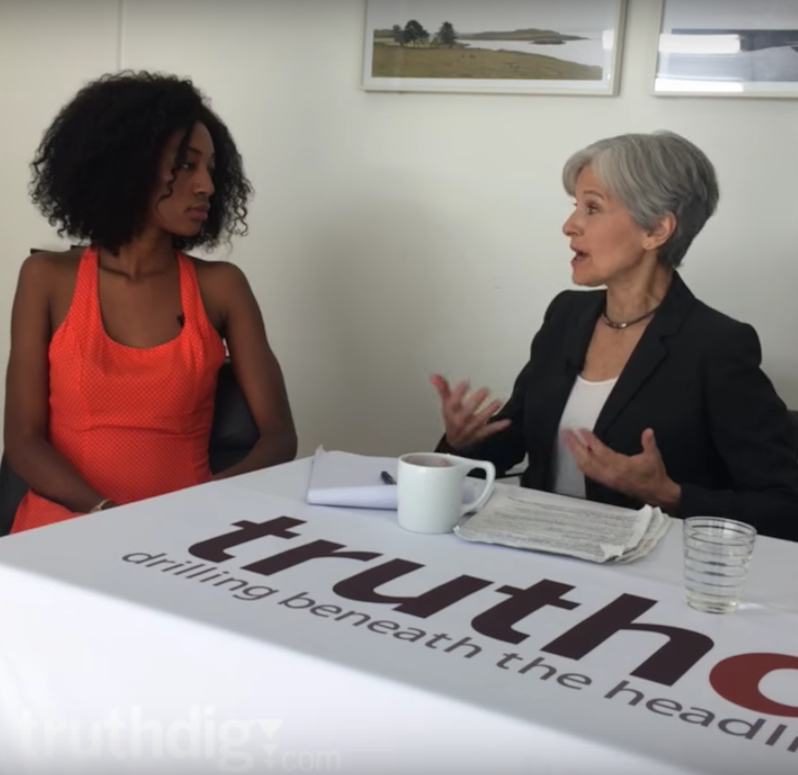Jill Stein Doesn’t Want to ‘Whitewash Our Dialogue’ When It Comes to Race (Video)
Her running mate, Ajamu Baraka, recently caused controversy when he labeled President Obama an "Uncle Tom" president. In a conversation with Truthdig, the Green Party presidential nominee addresses the often-uncomfortable conversation about race relations in America.
This week, Green Party presidential nominee Jill Stein sat down with Truthdig for a live conversation streamed to our Facebook page. Stein and the Truthdig staff discussed mainstream-media bias, Stein’s political qualifications and the future of the Supreme Court.
A critical moment in the conversation occurred when Stein addressed comments made by her running mate, Ajamu Baraka. Earlier this month, Baraka incited controversy when he labeled President Obama an “Uncle Tom” president—racially charged language Baraka continues to support.
Stein has been forced to address Baraka’s comment and the ensuing conflict. In a CNN town hall earlier this month, she refused to condemn his remarks. “I understand Ajamu’s passion, his frustration and his struggle,” she said. “I think we have all been guilty of using some language that doesn’t play well as a sound bite.”
The controversy shows no sign of fading. Earlier this week, The Washington Post editorial board published a harsh opinion piece in which it labeled Stein’s bid for president a “fairy-tale candidacy” with “policy ideas [that] are poorly formed and wildly impractical.”
During the Live at Truthdig discussion on Thursday, Editor in Chief Robert Scheer asked Stein about Baraka’s “Uncle Tom” comment. He noted Obama’s weak political history in addressing the unequal wealth of minorities and came to the conclusion that “the ‘Uncle Tom’ label may fit.”
Truthdig communications coordinator Sarah Wesley disagreed. “When that term is used, it’s racially charged, and it’s not OK,” she stated. Wesley also raised an issue voiced by many viewers after Stein’s CNN town hall. “When you were asked about your running mate’s comment,” she said, “I heard more of a politician speaking. It was like you didn’t really say it was wrong. … So my question is: Do you agree with the term ‘Uncle Tom,’ and is this what we should expect from the Jill Stein campaign in the future?”
“What you can expect from my campaign is a diverse discussion that draws on a lot of dialects,” Stein immediately responded. “I’m not here to whitewash our dialogue.” Her use of the word “dialects” in this context has been critiqued heavily by Washington Post writer Jonathan Capehart. “Dialect?!” he exclaims in a recent op-ed. “When did blacker-than-thou condescension become a ‘dialect’?”
Stein noted she “cannot presume to speak for” Baraka. “It may be painful, and it may be difficult,” Stein said of the uncomfortable conversation on race relations in America. “[One of] the unique things about our campaign is that we are not trying to duck the pain that exists in our society right now.”
“But I think you can tell the truth without using certain terms,” Wesley responded. “I would encourage you to talk to Ajamu about that,” Stein replied.
Overall, Stein’s polished response to the “Uncle Tom” controversy was similar to her response during the CNN town hall. Emily Cahn, a senior writer for Mic, argued that Stein gave “a vague answer with buzzwords” when addressing the “Uncle Tom” comment on CNN.
To decide whether Stein answered more effectively during the Truthdig session, watch the clip below, and check out the full Live at Truthdig discussion here.
—Posted by Emma Niles
Your support matters…Independent journalism is under threat and overshadowed by heavily funded mainstream media.
You can help level the playing field. Become a member.
Your tax-deductible contribution keeps us digging beneath the headlines to give you thought-provoking, investigative reporting and analysis that unearths what's really happening- without compromise.
Give today to support our courageous, independent journalists.





